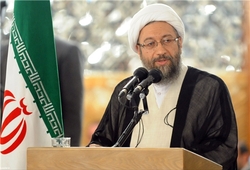 Iran's Judiciary Chief Sadeq Amoli Larijani said on Monday that the main objectives behind targeting the livelihood and economy of the nation is to drive a wedge between ordinary people and officials, and called for vigilance and insight to counter the psychological warfare against Tehran.
Iran's Judiciary Chief Sadeq Amoli Larijani said on Monday that the main objectives behind targeting the livelihood and economy of the nation is to drive a wedge between ordinary people and officials, and called for vigilance and insight to counter the psychological warfare against Tehran. RNA - Ayatollah Amoli Larijani called for attention to how Iranian’s livelihood and economy is being targeted by “some Westerners”, saying that the US economic war agansit Iran hand-in-hand with psychological operations are meant to divide between officials and ordinary people.
“Authorities must take steps to solve the economic problems and the people must also be vigilant of the enemy's psychological operations so that, with the prudence of the authorities and the insight of the people, we can neutralize the enemy's conspiracy against the system based on freedom and moral and religious values, and proudly continue our journey,” he added.
In a related front on Sunday, Iranian Foreign Minister Mohammad Javad Zarif said all capacities of the country must be mobilized to undermine the negative impacts of the US sanctions, highlighting that defeating the US policy of bringing Iran's oil exports to zero must stand atop the national agenda.
The Iranian top diplomat made the remarks in a meeting with Iranian lawmakers to present a report on the latest regional and international developments as well as his Ministry’s plans and activities.
“Using the various capacities of the country to meet the people's needs under the sanctions and defeating the US policy of bringing Iran's oil exports to zero and strong resistance against US pressures, inter alia, were some of the issues brought up by the Foreign Minister at the meeting,” one of the MPs present in the meeting recounted.
In a related front last week, Zarif underlined that the US sanctions have always been ineffective to change the policies of Iran, highlighting that Washington’s embargos just hurt ordinary people.
"They (sanctions) hurt ordinary Iranians but don't change (Iran’s) policy," he said in a post on his official Twitter account.
Referring to the policy adopted by the previous US administration to start talks with Iran over the country's nuclear program, Iran's diplomatic chief said, "It was U-turn on part of US, which allowed #IranTalks to proceed. Same dynamic today," in a clear reference to the fact that instead of withdrawing from the Iran nuclear deal, the new American government had better settle its disputes with Iran at the negotiating table.
Zarif added in his Twitter post that Iran and the remaining signatories to the JCPOA "are at table," emphasizing that "it is [the] US, which has decided to walk away and sow violence & chaos."
Earlier on December 15, Zarif told the forum in Qatari capital city of Doha that Iran has survived all the US pressures and sanctions in the past 40 years, highlighting that the ones who abandon engagement with Tehran will be the losers.
“Trump has called for negotiations despite his hostile policies, and we have responded to him that if he was joking,” he highlighted there.
Earlier on November 05, the European Union, France, Germany and Britain issued a joint statement regretting US' decision to impose new sanctions against Iran, saying that they will continue supporting the European companies engaging in legal business with Iran.
The reaction came after the US Treasury Department announced all sanctions on Iran lifted under the 2015 nuclear deal will be back in force on November 5.
According to Treasury Secretary Steven Mnuchin, the sweeping sanctions will see 700 people blacklisted, including people who were granted relief under the 2015 deal, as well as over 300 new names.
Mnuchin said the sanctions will also target payments made through the EU’s SPV channel.
He also warned global financial messaging service SWIFT that it could be punished if it doesn’t cut off financial services to entities and individuals doing business with Iran.
"SWIFT is no different than any other entity… We have advised SWIFT that it must disconnect any Iranian financial institutions that we designate as soon as technologically feasible to avoid sanctions exposure,” he noted.
His remarks dismissed an earlier report by The Washington Free Beacon, which claimed senior State Department officials have convinced Secretary of State Mike Pompeo to allow Iran to remain connected to SWIFT.
The Trump administration earlier agreed to allow eight countries to continue purchasing Iran’s crude oil after Washington’s sanctions on Tehran take place next Monday.
A senior administration official told Bloomberg that waivers were aimed at preventing oil price hikes and would be granted in exchange for continued import cuts.
US President Donald Trump announced on May 8 that Washington would no longer remain part of the Joint Comprehensive Plan of Action (JCPOA) and promised to re-impose the highest level of economic sanctions against Iran.
After Trump's declaration, the Iranian government issued a statement, calling the US withdrawal as "unlawful". The statement underlined Iran's prerequisites for continuing the deal with the five world powers. These conditions that were reiterated later by Iran's Supreme Leader Ayatollah Seyed Ali Khamenei later mainly included Iran's guaranteed crude sales and transfer of its revenues back home.
847/940